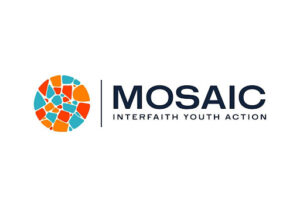 Youth from various backgrounds and beliefs connect across differences to build community and advance social justice through action and advocacy.
Youth from various backgrounds and beliefs connect across differences to build community and advance social justice through action and advocacy.
At Mosaic: Interfaith Youth Action, formerly Kids4Peace Boston, youth from various backgrounds and beliefs connect across differences to build community and advance social justice. Youth come together to form an interfaith community, learning about each other’s faith and values-based traditions. Mosaic participants are actively creating a better world around them, whether it is through leading interfaith workshops and dialogues for other youth, participating in service projects, advocating their views to lawmakers, or standing up for inclusivity and against bigotry in their communities
Mission:For over a decade, Mosaic: Interfaith Youth Action has brought young people from diverse religious communities together across differences to contribute to the common good. We use an interfaith lens as both a call to action and basis for our mission to bridge society’s divides, creating more just, peaceful, and equitable communities through interfaith connection, leadership skill development, and action.
Vision:We envision a society where youth are active participants in the construction of a more just, equitable, and peaceful world, where collaboration across divides is the norm. With this collaborative youth-adult effort, Mosaic aims to provide the space and skills to create an intentional diverse community, and act collectively for social justice.
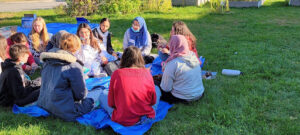
Programs:
Mosaic provides programs for teens, grades 7-12. There are multiple entry points to participate.
Circles of Action: Circles of Action gives youth the chance to make a real difference in their community. Youth are matched with a group of about 8 diverse, interfaith participants and 1-2 mentors to research a social justice issue of their choice and then design and implement a project to help make an impact on that issue. Youth learn important skills like research, interviewing, project management, advocacy/lobbying, public speaking, dialogue, cooperative problem solving, and more.
Community Workshops: Mosaic workshops encourage youth to consider how their own faith identity motivates them to engage in interfaith dialogue and work for social action. Youth learn about different faith traditions and deepen their own religious identity. Workshop topics focus on deepening knowledge of different faith traditions, and giving youth the language and tools they need to create an inclusive world. Participants also have a chance to visit houses of worship around the Greater Boston Area, observing prayers and meeting religious leaders. Mosaic workshops build skills to create a world where everyone is truly included and valued, and youth have a lot of fun meeting new people and forming friendships to last a lifetime in the process!
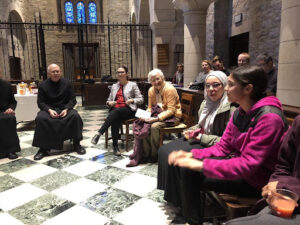
Bridges: Bridges connects young people who are involved in the work of their faith communities, bringing them together to consider how their faith calls them to action in interfaith dialogue. Cohorts of 3-4 geographically connected Houses of Worship gather in-person and on-site during Fall, Winter, and Spring meetings. Youth commit to participate in three events run by Mosaic staff, developing connections and community across religious traditions. Over the course of the year, youth develop skills in interfaith literacy, communication, active listening, and interfaith dialogue. Bridges not only furthers connections across communities; it deepens the community already cultivated within religious communities.
Learning Model:
At Mosaic, youth learn through doing, engaging in action and dialogue, while having a lot of fun! In order to prepare youth for vulnerable and personal conversations around religious and values-based identities, we focus on building a community of care where participants feel safe and trust one another. Content is delivered primarily through experiential learning, and always processed through reflective exercises.
Mosaic has a multi-modal approach to interreligious learning, with experience always at the fore. David Kolb’s experiential learning cycle is the primary method through which we learn and teach, with additional methods still being understood through this approach, such as project-based learning.
The experiential learning cycle relies on four major components:
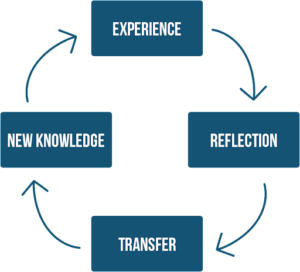
Experiences and reflection happen within our Mosaic program time, and will be very familiar to our participants! Experiences are what one would think of as the primary “learning” moments, when a staff member could be teaching something, a game-based learning experience could be shared, or youth might be engaged in an activity where they are discovering new knowledge for themselves. However, the ELC model makes clear that there is a lot more to learning than just that initial moment of content delivery!
After we all share an experience together, we take time to reflect on what we have just experienced. It is common for us to consider what we have observed, how we communicated effectively, how we might have been more successful, and what we would change if we were to do the activity again. This reflection time helps youth process and internalize the initial experience, allowing for a successful transfer of the experience back into their everyday lives—taking what they have learned from Mosaic and bringing it back to their home communities, families, schools, and faith traditions. From there, new knowledge is generated, and the cycle begins again! It is important to notice that this model is a cycle, that it keeps going on continually. We are all perpetually working to learn and grow more, and experience is the way that Mosaic finds we can do that very effectively—and we have a lot of fun in the process!
History:
Mosaic was founded in 2010 as Kids4Peace Boston by Peggy Stevens, a gifted educator, former middle and high school teacher, and an active member of the local interfaith community. Peggy mobilized Boston-area volunteers, donors, and youth, as well as her colleagues at the American Youth Foundation (a leading U.S. youth development and camping organization), to undertake our first initiative in 2011: hosting a two-week peacebuilding camp for 7th grade Palestinian and Israeli youth from Kids4Peace Jerusalem (now Seeds of Peace) and their peers from the Boston-area.
After a successful first summer, Boston youth and their families requested ongoing opportunities to build community and continue their skill-building. This interest grew as Peggy, with other volunteers, recruited consecutive groups of Boston-area rising 7th graders to attend camp each summer, provided additional programs during the school year, and ultimately defined our year-round program.
As our reputation for providing meaningful youth programs grew, so did the interest and trust of many local churches, temples, mosques, schools, and organizations. Today, Mosaic offers multiple programs for middle and high schoolers throughout Massachusetts and beyond, and has expanded past our original focus of the Israeli-Palestinian conflict. Mosaic helps young people understand social justice issues impacting them and their communities near and far, and has deepened its emphasis on helping young people take action on the issues they care about through multiple means, including lobbying and advocacy. Mosaic welcomes youth of all faith backgrounds.
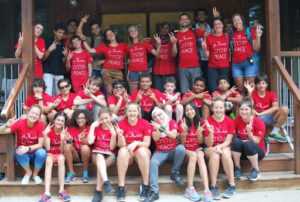
Impact:
Mosaic youth are active participants in changing our world for the better—not just as future leaders—but as leaders right now. They understand their roles in creating a better world, identifying as changemakers and taking action to make their visions for a better world a reality.
We work together with youth from all backgrounds and creeds to achieve the following:
-
- Understanding Others and Being Understood:Youth learn to respect those who are different, see things from their point of view, and show them empathy. This skill becomes key in bridging divides and building coalitions for change.
- Communication Across DifferenceYouth learn how to communicate openly and honestly with others to address social problems.
- Equipped to Engage Across DifferenceYouth learn to intentionally engage diversity, working with others in positive ways.
- Identity DevelopmentYouth learn to define and explain their identity, values, and beliefs.
- Activism
Youth become engaged in making positive social change in their community
Impact by the numbers:
350+ Lobbying and advocacy messages have been delivered to local, state, and federal lawmakers by Mosaic youth
Mosaic serves over 155 congregations and communities
Mosaic has impacted over 250 youth participants per year
Among Other Things, Mosaic Participants Report Increases in:
-
- knowledge of others’ faith traditions
- having a close friend of another faith tradition
- knowledge of their own faith and how their faith calls them to work for social justice
- overall self confidence and confidence in their own identity
- ability to communicate effectively with diverse groups of people regarding societal issues, and working collaboratively to find solutions
- ability to see issues from other perspectives
- ability to stand up to negative comments about their own and others’ identities
- seeing results of active engagement making positive social change
Youth Testimonials:
Kids4Peace Boston [Mosaic] is important to me because it brings youth with different views together to create change… in a world where sometimes that feels impossible.
-10th Grade Muslim Mosaic Participant
I have a number of longtime friends from before Kids4Peace [Mosaic]. We hang out and have fun together. But my Kids4Peace [Mosaic] friends are a different type of friends. They come from different backgrounds. I would never otherwise get to know them. We have deeper and more substantial conversations—and these help me as I try to figure out who I am. We fundamentally trust one another.
-12th Grade Jewish Mosaic Participant
My involvement with Kids4Peace [Mosaic] has given me the tools and skills to embrace the differences in the world and to learn how to love those differences. I’ve learned how to go into the world and lead by example, teaching others about that love.
-12th Grade Christian Mosaic Participant
Parent and Community Testimonials:
I’ve watched Kids4Peace Boston [now Mosaic] grow from an idea to a small community of middle school youth and families to what is now a robust organization that provides leadership development, lasting interfaith relationships, and practical peacebuilding skills to a diverse and ever widening circle of Boston area 12-19 year olds. The K4PB [Mosaic] experience is forming a new generation of leaders who are ready and able to take on the challenges, live through the tension, and experience the joy of our increasingly pluralistic world.
– Rev. Dan Smith (Senior Minister, First Church in Cambridge
K4PB [Mosaic] is unique in providing a growthful, educational, and fun forum for Muslim, Jewish, and Christian teenagers to develop into thoughtful citizens with an appreciation for religious, class, and racial diversity. As an Orthodox rabbi and parent I am thrilled my boys have this opportunity to develop real friendships with Christian and Muslim young people while learning leadership skills. K4PB [Mosaic] is enabling them to develop into well-rounded young men with an appreciation for their own culture and religion as well as for Islam and Christianity. As countries around the world become more suspicious of “the other,” K4PB [Mosaic] is providing and incredibly valuable service, educating our children to be leaders and advocates for diverse, multi-faith communities.
-Rabbi David Jaffe (Mosaic Parent, Author, Jewish Educator)
Kids4Peace Boston [Mosaic] is so much more than building interfaith harmony, the children learn how to stand up for their beliefs equipped with well-versed and well-thought out information. A side benefit that we never expected to see in our children is the way they have grown in self-confidence, build deeper values, and have become even better global citizens. They are able to put faces to issues and look deeper into issues than ever before with a greater understanding that difference is what makes this world so special.
– Parent of 7th Grade Christian Participant
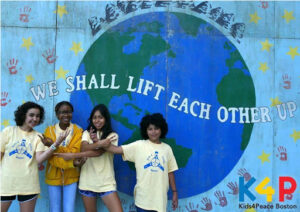
Contact Information:
Matthew Anderson, Executive Director
Matt@mosaicaction.org
www.mosaicaction.org
Social Media:
www.facebook.com/mosaicaction
www.twitter.com/mosaicaction
https://www.linkedin.com/company/mosaicaction/
